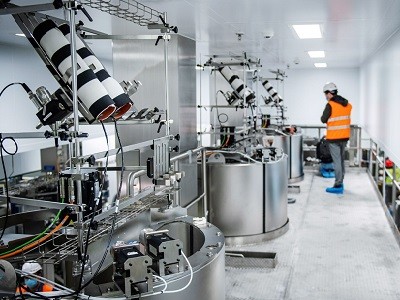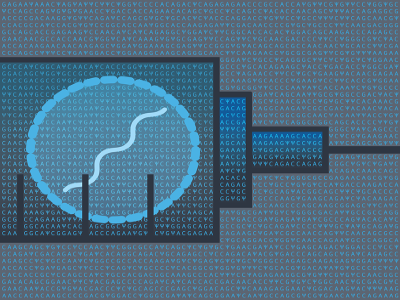Angela Evatt lay face down underneath anaesthesia as surgeons eliminated a malignant mole from her again and a lymph node from her left armpit. The aim of the operation was not solely to excise the cancerous tissue from her physique, but in addition to start the method of crafting a customized vaccine that will practice Evatt’s immune system to assault any tumour cells left behind.
The vaccine makes use of messenger RNA (mRNA), rigorously constructed to encode the distinctive mutant proteins, often called neoantigens, which can be discovered on the floor of Evatt’s melanoma pores and skin most cancers cells. She first acquired this bespoke vaccine, alongside a potent immune-stimulating drug often called a checkpoint inhibitor, as a part of a scientific trial in March 2020, simply months earlier than mRNA vaccines would develop into family names within the battle towards COVID-19.
Each three weeks, Evatt travelled from her house in Maryland to Georgetown College’s Lombardi Complete Most cancers Heart in Washington DC to get an injection in every arm. The mRNAs enter her wholesome cells after which produce the neoantigens that educate her immune system.
Regardless of Evatt experiencing extreme flu-like signs for a day or two after every injection — fever, achiness, chills — the remedy appears to have been useful. Now in her mid-40s, she has remained in remission for greater than three years after finishing her remedies.
Why are so many younger individuals getting most cancers? What the info say
As is typical of particular person experiences in scientific trials, figuring out the exact impression of the vaccine on Evatt’s restoration is troublesome. “It’s unattainable to know,” she says. “I’m simply completely satisfied to be cancer-free.” Nonetheless, the trial that Evatt participated in is yielding promising knowledge. In response to the newest number-crunch from the 157-person research, the mix of vaccine and checkpoint inhibitor reduces the chance of illness recurrence by practically 50% in contrast with remedy with the inhibitor alone. The newest evaluation additionally signifies that the vaccine contributes to lifespan extension.
“On the finish of the day, you understand, ‘Rattling! This mixture appears to have exercise,’” says lead trial investigator Jeffrey Weber, a most cancers immunotherapy researcher at New York College Langone Well being in New York Metropolis, who offered the findings on 3 June on the world’s largest annual assembly of most cancers biologists and oncology specialists in Chicago, Illinois. (Weber and his colleagues printed a earlier evaluation of the info firstly of this 12 months1.)
A bigger-scale research continues to be wanted to substantiate these promising outcomes and to assist bringing the vaccine to market. A trial involving greater than 1,000 individuals with melanoma kicked off final July; one other for practically 900 individuals who have a kind of lung most cancers started a number of months later.
However even because the most cancers analysis group awaits additional proof, the early outcomes have injected contemporary enthusiasm into the most cancers vaccine discipline. “It has had a big effect throughout all vaccine improvement,” says tumour immunologist Nora Disis, director of the Most cancers Vaccine Institute on the College of Washington in Seattle. After a long time of vaccine trial setbacks, she says, “we’ve began to see the pendulum swing”.
Success is much from assured, nevertheless, and the sphere is thick with unresolved questions. Firms are attempting to find out which levels of most cancers will see essentially the most profit from such remedies. They’re additionally looking for improved methods to foretell the simplest neoantigens. And it’s unclear whether or not mRNA or another vaccine expertise is the easiest way to stimulate an anticancer immune response.
As scientists proceed to check the remedies, all the items might want to come collectively.
“We’ve the primary proof of idea that these items can work,” says Cristina Puig-Saus, a most cancers immunologist on the College of California, Los Angeles. “Now, we simply have to make them higher.”
Vaccines on demand
Moderna, the corporate behind the vaccine that Evatt acquired, is without doubt one of the business leaders engaged on these enhancements. Capitalizing on its expertise and the monetary windfall from its COVID-19 response, the corporate has refined its manufacturing protocols and expanded capability to supply personalised medicines across the clock.
In a football-pitch-sized manufacturing facility in Norwood, Massachusetts — a brief drive from Moderna’s headquarters in Cambridge — boring black traces divvy up the gray flooring into 15 bays, the place pairs of technicians can work in parallel. Every bay homes its personal ‘single use personalised RNA+’ machine, a refrigerator-sized unit that cranks out lengthy strands of mRNA encoding as much as 34 particular most cancers mutations. The mutations correspond to completely different neoantigens, neatly organized in a sequence. A mixing system then encapsulates the mRNA in fatty nanoparticles to reinforce its stability and mobile uptake.
How COVID unlocked the facility of RNA vaccines
“That’s the magic there,” says Elizabeth Sullivan, head of operations for the personalised vaccine programme at Moderna, as she leads a tour of the corporate’s manufacturing plant in mid-April.
Much less seen are the improvements that go into choosing which of the various attainable tumour mutations are almost definitely to elicit an immune response in a vaccine recipient. A sequence of artificial-intelligence algorithms make this name, knowledgeable by an ever-growing repository of scientific and laboratory knowledge from different people that, in line with Moderna’s oncology lead, Kyle Holen, ought to yield higher predictions over time. “It’s a remedy that learns and might proceed to enhance,” he says.
Moderna, in partnership with the drug agency Merck, which is headquartered in Rahway, New Jersey, is at present conducting mid- to late-stage scientific trials of its vaccine throughout 5 sorts of most cancers.
In all of those trials, the businesses administer their experimental vaccine to individuals who, like Evatt, have had their tumours surgically eliminated however nonetheless face a excessive threat of most cancers recurrence. By coaching the immune system’s T cells to determine and eradicate most cancers cells at this stage, the target is to avert a relapse — an method often called adjuvant remedy.
Moderna executives have additionally raised the potential for the vaccine getting used towards later-stage illness, when the most cancers has unfold to distant websites all through the physique, a course of often called metastasis. However, thus far, the sphere has had restricted success on this setting. Though preliminary trials have typically discovered that personalised vaccines produce anticancer T cells in people with these kind of superior most cancers, these immune responses hardly ever result in tumour regression or long-term survival advantages.

Angela Evatt acquired an mRNA most cancers vaccine in March 2020, after having cancerous tissue on her again eliminated. The most cancers has not returned.Credit score: Angela Evatt
“It’s very laborious to eradicate established tumours,” says Gal Cafri, a most cancers immunologist on the Sheba Medical Heart in Ramat Gan, Israel. The forms of T-cell response that most cancers vaccines elicit are effectively outfitted for restraining the expansion of small, residual tumours, which helps to stop illness recurrence after surgical procedure. Nonetheless, these vaccines are much less efficient towards massive, established tumours, which have typically developed aggressive techniques that contain shielding themselves from immune assaults.
Furthermore, early-stage cancers have a tendency be slower-growing than late-stage ones, which provides drug builders the 1–4 months they should design, manufacture and ship the personalised vaccines to sufferers. Then, as soon as the vaccine enters the physique, extra “time is required to construct up an immune response”, says Uğur Şahin, co-founder and chief government of the biotechnology firm BioNTech in Mainz, Germany, which is creating a customized most cancers vaccine in collaboration with biotech agency Genentech in South San Francisco, California.
In response to Sahin and Ira Mellman, head of most cancers immunology at Genentech, all of those concerns factored into the businesses’ joint resolution to judge their bespoke mRNA vaccine as a post-surgical remedy for individuals with high-risk colorectal and pancreatic cancers which can be nonetheless localized and haven’t but unfold throughout the physique. “When serious about the place is the most effective place to place a most cancers vaccine that will give it the most effective probability of succeeding and establishing no less than proof of idea,” Mellman says, “all roads result in adjuvant or early illness.”
He even retains a espresso mug on his desk to commemorate when this strategic resolution was made. It reads “2018 A.D.”, standing for ‘Adjuvant Day’.
Particular supply
Each the Moderna–Merck and BioNTech–Genentech vaccines are formulated as mRNA. However that’s not the one solution to encode neoantigens for processing and presentation to the immune system.
Instead of mRNA, many corporations and educational teams depend on DNA, peptides or genetically engineered viruses. As Niranjan Sardesai, founder and chief government of Geneos Therapeutics in Philadelphia, Pennsylvania, factors out, every method triggers its personal kind of immune response, which might have an effect on the success of any vaccine candidate. “The way you ship these antigens is simply as essential as which antigens you ship,” Sardesai says.
Some platforms, for instance, excel at eliciting ‘killer’ T cells, that are thought to carry out the majority of tumour-cell destruction. Nonetheless, the real-world impression of such an immunological distinction stays to be seen, as a result of solely the vaccine developed by Moderna and Merck has thus far proven success in a randomized trial.
The tangled historical past of mRNA vaccines
A much bigger differentiator, researchers say, might be the computational engines that assist to find out the vaccine’s composition. Every engine has its personal proprietary suite of instruments that it makes use of to pick out which neoantigens to focus on.
Most corporations begin with genetic sequencing of knowledge from tumours and wholesome tissues to disclose the mutations that cropped up throughout most cancers improvement. T cells won’t acknowledge all of those mutations, nevertheless, so algorithms are used to prioritize a subset — Moderna makes use of as much as 34, BioNTech as much as 20 — which can be predicted to have essentially the most potent immune-stimulating results.
Such predictions are made on the idea of assorted components, equivalent to the degrees at which neoantigens are expressed on tumour surfaces and their anticipated binding to mobile receptors that help in frightening a T-cell response. Machine-learning fashions then incorporate experimental knowledge to enhance the accuracy of those instruments.
The algorithms can miss their mark in frightening a cancer-directed immune response, nevertheless. “Solely a small proportion of the anticipated neoantigens become immunogenic,” notes Neeha Zaidi, an oncologist on the Sidney Kimmel Complete Most cancers Heart at Johns Hopkins College in Baltimore, Maryland.
In a small research2 of the BioNTech–Genentech vaccine for treating pancreatic tumours, for instance, solely half of the trial members developed T cells that have been directed towards any of the vaccine-encoded mutations. And amongst those that did, round half shaped T cells towards only a single neoantigen, regardless that the vaccines usually contained the directions for making ten or extra targets2.
“From time to time, the celebs line up,” says Alex Rubinsteyn, a computational biologist on the College of North Carolina–Chapel Hill who designs neoantigen prediction instruments for personalised most cancers vaccines. However, he says, cases by which a number of of the chosen antigens elicit anti-tumour exercise might be the exception somewhat than the rule. Benjamin Vincent, a tumour immunologist, additionally on the College of North Carolina–Chapel Hill, agrees: “The sphere actually, actually desires to simply say, ‘We will predict this from the genomics knowledge solely.’ It actually desires it so dangerous, everyone seems to be simply doing it. However that doesn’t make it sturdy.”
Addressing this subject head on, many researchers are actually supplementing their computational instruments with additional experimental knowledge. In February, for instance, a joint group on the La Jolla Institute for Immunology and the College of California, San Diego described a platform that makes use of DNA sequencing and gene-expression analyses on tumours to first determine potential neoantigens, as many others do already. The method then goes a step additional by looking out in affected person blood samples for T cells that truly acknowledge these antigens3.
This type of technique goes to develop into extra vital and extra prevalent, in line with Stephen Schoenberger, a translational immunologist who co-led the research. “It verifies somewhat than merely predicts which mutations are neoantigens,” says Schoenberger, who can be chief government and chief scientific officer of Lykeion, an organization he co-founded in La Jolla to develop personalised vaccines knowledgeable by this technique.
Sachet Shukla, a computational biologist on the College of Texas MD Anderson Most cancers Heart in Houston, is hopeful that the immune-stimulating potential of personalised most cancers vaccines will enhance because the analysis group amasses extra of this info. “I feel you’ll see one other step leap within the accuracy of those algorithms,” he says.
When that occurs, he anticipates that most cancers vaccines, lengthy considered ineffectual, will lastly develop into a staple of oncology remedy: “It’s an thought whose time has come.”





